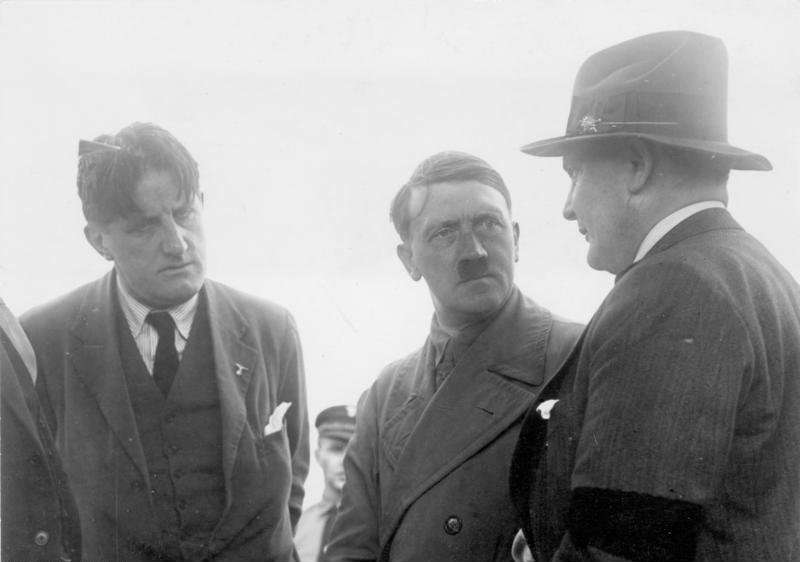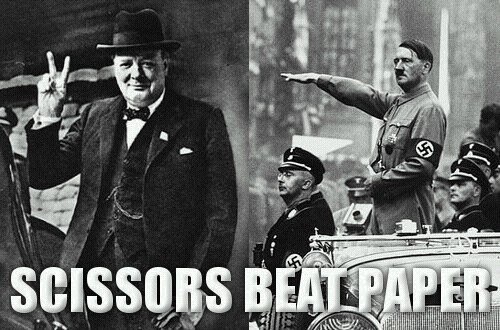When Churchill Came Within Twenty Yards of Hitler November 27, 2014
Author: Beach Combing | in : Contemporary , trackbackHistorians have made a great deal between that all-too often drunk British genius Churchill and his abstemious German rival, the murderous Hitler. The two gradually came to loathe each other. Hitler loved to blame Churchill for many of the disasters of the war (sometimes correctly); while Churchill went on the record as saying that when captured Hitler should be taken out and shot in the street like a dog (harsh words from an individual who boasted constantly of his easy Christian morality). Historians have had fun with the obvious contrasts between the two, of course. Andrew Roberts wrote Hitler and Churchill and Lukacs produced The (brilliant) Duel pairing the two for narrative drama. But did they ever meet? The answer to that is ‘no, but almost’. In the summer of 1932, with Hitler on the verge of power, Churchill travelled through the Lowlands and Germany researching his Life of Marlborough. This took him to the battlefield of Blenheim and a hotel in Munich.
At the Regina Hotel [in Munich] a gentleman introduced himself to some of my party. He was Herr Hanfstaengl, and spoke a great deal about ‘the Fuehrer,’ with whom he appeared to be intimate. As he seemed to be a lively and talkative fellow, speaking excellent English, I asked him to dine. He gave a most interesting account of Hitler’s activities and outlook. He spoke as one under the spell. He had probably been told to get in touch with me. He was evidently most anxious to please. After dinner he went to the piano and played and sang many tunes and songs in such remarkable style that we all enjoyed ourselves immensely. He seemed to know all the English tunes that I liked. He was a great entertainer, and at that time, as is known, a favourite of the Fuehrer. He said I ought to meet him, and that nothing would be easier to arrange. Herr Hitler came every day to the hotel about five o’clock, and would be very glad indeed to see me.

So many questions. First, who was ‘Herr Hanfstaengl’? Well, he was Ernst ‘Putzi’ Hanfstaengl (1975), a half German, half American alumnus of Harvard who became an admirer of Hitler until 1933 when he was removed from Hitler’s staff: he is pictured on the left of the photo above. EH actually escaped to Switzerland in the later 1930s after he came to believe that Hitler wanted him dead (another post, another day, it involves a practical joke and a stiffed parachute). Hanfstaengl, by the way, subsequently wrote that Churchill’s memory was at fault and that Churchill was staying at the Hotel Continental not the Regina.
Next, is it possible that Hanfstaengl was a Hitler plant to get to know Churchill? Churchill had a very strong sense of his own importance, even in the wilderness years, while EH’s drive to please seems to have been part of the man’s character (look again at the photo), rather than a reflection of any Nazi interest in the British bulldog. In fact, Hanfstaengl, whose brief dalliance with the Nazi was later regretted and with it any need for subterfuge, wrote many years aftewards that it was Churchill’s son Randolph who tried (perhaps without his father knowing?) to set up a meeting with Hitler through EH. Hitler by Hanfstaengl’s account was not interested: ‘Hitler produced a thousand excuses as he always did when he was afraid of meeting someone.’ He then later ‘funked’ the meeting in Hanfstaengl’s words: Hitler strayed into the hotel foyer to meet a Dutchman, while Churchill and party were drinking just yards away. Churchill would never have believed this, but Hitler seems not even to have been very clear who Churchill was.
In any case, Churchill continues.
I had no national prejudices against Hitler at this time. I knew little of his doctrine or record and nothing of his character. I admire men who stand up for their country in defeat, even though I am on the other side. He had a perfect right to be a patriotic German if he chose. I always wanted England, Germany, and France to be friends. However, in the course of conversation with Hanfstaengl, I happened to say, ‘Why is your chief so violent about the Jews? I can quite understand being angry with Jews who have done wrong or are against the country, and I understand resisting them if they try to monopolise power in any walk of life; but what is the sense of being against a man simply because of his birth? How can any man help how he is born?’ He must have repeated this to Hitler, because about noon the next day he came round with rather a serious air and said that the appointment he had made with me to meet Hitler could not take place, as the Fuehrer would not be coming to the hotel that afternoon. This was the last I saw of ‘Putzi’ – for such was his pet name – although we stayed several more days at the hotel. Thus Hitler lost his only chance of meeting me. Later on, when he was all-powerful, I was to receive several invitations from him. But by that time a lot had happened, and I excused myself.
Again some questions. Was it really this ‘Jewish’ comment that cast Churchill out of favour with Hitler? Churchill was famously pro-Jewish, one of Martin Gilbert’s many books on WS is Churchill and the Jews: A Lifelong Friendship. But it is also true that while Hitler could override his anti-Semitism for political gain, it was a visceral part of his character, not, say, the apparently insincere anti-Semitism of Mussolini. EH, in his account, agrees that Churchill talked about anti-Semitism. In fact, he quotes Churchill as saying (this is credible and sounds Churchillian and sensible): ‘Tell your boss from me that anti-Semitism is a good starter but a bad sticker.’ Hanfstaengl also says, however, that he never shared these comments with Hitler. As to the later invitation Churchill was asked to go to Germany in 1937 by the Reich. Churchill decided though that visiting Hitler as a private individual ‘I should have placed myself and my country at a disadvantage’, whereas he would have gone (it is implied with joy) as a representative of the British government, an advantage that he would not have again till 1939 when it was too late. Churchill goes on to state (correctly) that Hitler managed to make all those British ‘privates’ who visited him look like complete chumps, Lloyd George chief among them.
Churchill had many extraordinary abilities and some frightening failings, but worth mentioning here is his very keen nose for evil. By 1932 he may not have known enough about Hitler to make a judgement, but by 1937 he seems to have decided that he was dealing with a harridan from the pit of a black hell. He was right. Hitler’s nose for his natural enemies may have been finer though. No meeting between the two men could have been very happy in 1918, 1932, 1937 or at any other date, but what a meeting to photograph or sit in on…
Other almost meetings: drbeachcombing AT yahoo DOT com
29/Nov/ 2014 LTM has kindly written in with these thoughts and quotations
Then again, Hitler may have known of Churchill from some of Churchill’s anti-Bolshevik newspaper articles:
First there are the Jews who, dwelling in every country throughout the world, identify themselves with that country, enter into its national life and, while adhering faithfully to their own religion, regard themselves as citizens in the fullest sense of the State which has received them. Such a Jew living in England would say, ‘I am an English man practising the Jewish faith.’ This is a worthy conception, and useful in the highest degree. We in Great Britain well know that during the great struggle the influence of what may be called the ‘National Jews’ in many lands was cast preponderatingly on the side of the Allies; and in our own Army Jewish soldiers have played a most distinguished part, some rising to the command of armies, others winning the Victoria Cross for valour.
There is no need to exaggerate the part played in the creation of Bolshevism and in the actual bringing about of the Russian Revolution, by these international and for the most part atheistical Jews, it is certainly a very great one; it probably outweighs all others. With the notable exception of Lenin, the majority of the leading figures are Jews. Moreover, the principal inspiration and driving power comes from the Jewish leaders. Thus Tchitcherin, a pure Russian, is eclipsed by his nominal subordinate Litvinoff, and the influence of Russians like Bukharin or Lunacharski cannot be compared with the power of Trotsky, or of Zinovieff, the Dictator of the Red Citadel (Petrograd) or of Krassin or Radek — all Jews. In the Soviet institutions the predominance of Jews is even more astonishing. And the prominent, if not indeed the principal, part in the system of terrorism applied by the Extraordinary Commissions for Combating Counter-Revolution has been taken by Jews, and in some notable cases by Jewesses. The same evil prominence was obtained by Jews in the brief period of terror during which Bela Kun ruled in Hungary. The same phenomenon has been presented in Germany (especially in Bavaria), so far as this madness has been allowed to prey upon the temporary prostration of the German people. Although in all these countries there are many non-Jews every whit as bad as the worst of the Jewish revolutionaries, the part played by the latter in proportion to their numbers in the population is astonishing.
- “Zionism versus Bolshevism”, Illustrated Sunday Herald (February 1920)
(A note: Churchill viewed Bolshevism as a heavily Jewish phenomenon. He contrasted the Jewish role in the creation of Bolshevism with a more positive view of the role that Jews had played in England.)
- …the schemes of the International Jews. The adherents of this sinister confederacy are mostly men reared up among the unhappy populations of countries where Jews are persecuted on account of their race. Most, if not all of them, have forsaken the faith of their forefathers, and divorced from their minds all spiritual hopes of the next world. This movement among the Jews is not new. From the days of Spartacus-Weishaupt to those of Karl Marx, and down to Trotsky (Russia), Bela Kun (Hungary), Rosa Luxembourg (Germany), and Emma Goldman (United States), this world-wide conspiracy for the overthrow of civilisation and for the reconstitution of society on the basis of arrested development, of envious malevolence, and impossible equality, has been steadily growing. It played, as a modern writer, Mrs. Webster, has so ably shown, a definitely recognisable part in the tragedy of the French Revolution. It has been the mainspring of every subversive movement during the Nineteenth Century; and now at last this band of extraordinary personalities from the underworld of the great cities of Europe and America have gripped the Russian people by the hair of their heads and have become practically the undisputed masters of that enormous empire.
- Rt. Hon. Winston Churchill ‘Bolshevism versus Zionism; a struggle for the soul of the Jewish people’ in Illustrated Daily Herald, 8 February 1920.
http://en.wikiquote.org/wiki/Winston_Churchill



